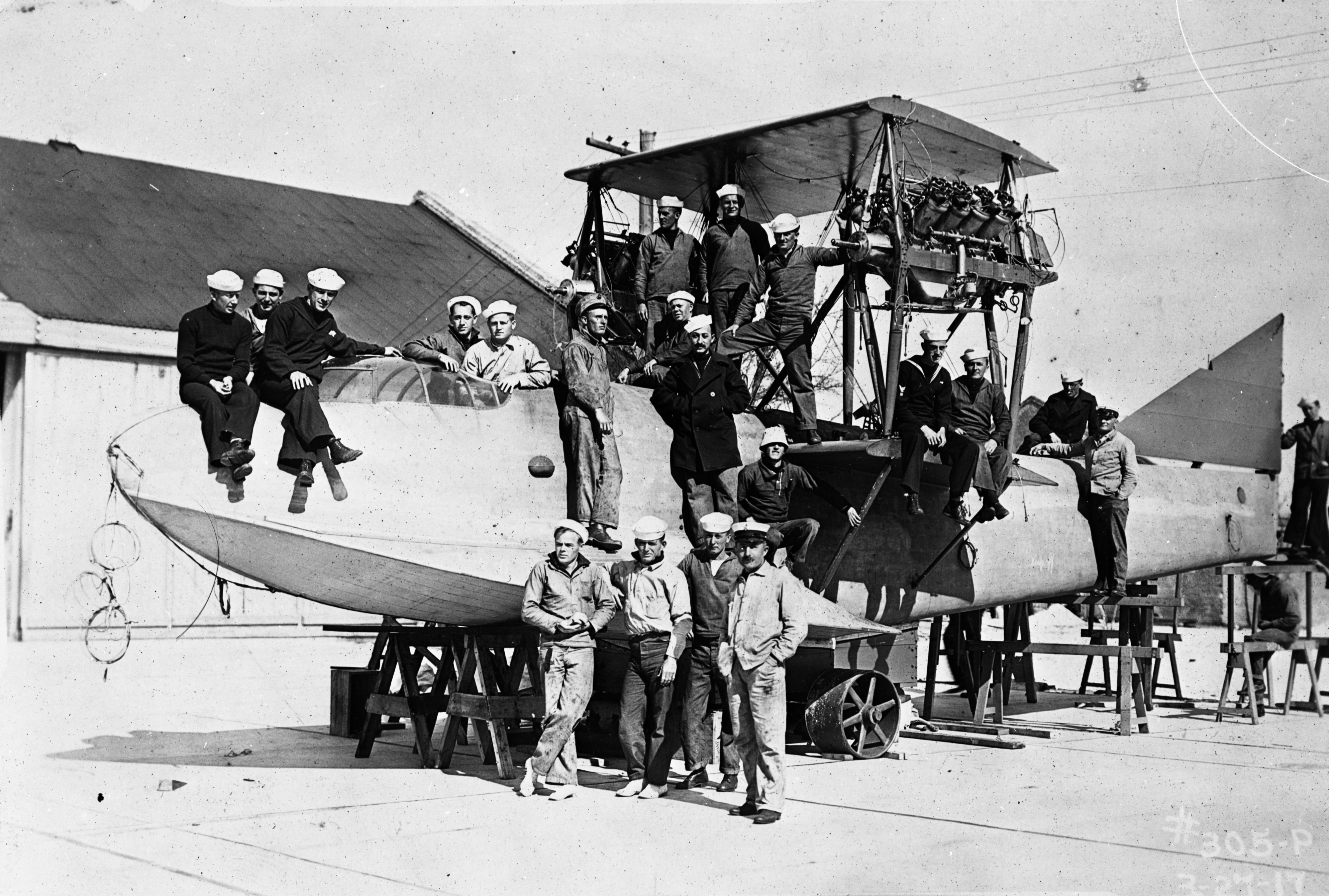Mary McLeod Bethune
Lesson Plans
Draft of Interview Questions
This document appears to be a list of questions that Daniel Williams sent to Mary McLeod Bethune as part of an ongoing discussion regarding the planned biography. Williams mentions that he will enclose a chapter of the book.
Page 1
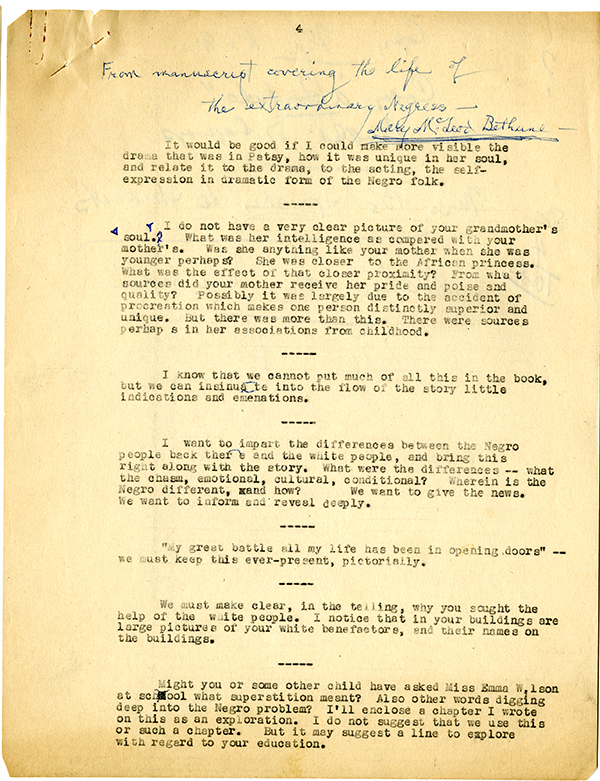
From manuscript covering the life of the extraordinary Negroes — Mary McLeod Bethune
It would be good if I could make more visible the drama that was in Patsy, how it was unique in her soul, and relate it to the drama, to the acting, the self-expression in dramatic form of the Negro folk.
I do not have a very clear picture of your grandmother’s sole. What was her intelligence as compared with your mother’s? Was she anything like your mother when she was younger perhaps? She was closer to the African princess. What was the effect of that closer proximity? From what sources did your mother receive her pride and poise and quality? Possibly it was largely due to the accident of procreation which makes one person distinctly superior and unique. But there was more than this. There were sources perhaps in her associations from childhood.
I know that we cannot put much of all this in the book, but we can insinuate into the flow of the story little indications and emanations.
I want to impart the differences between the Negro people back there and the white people, bring this right along with the story. What were the differences — what the chasm, emotional, cultural, conditional? Wherein is the Negro different, and how? We want to give the news. We want to inform the reveal deeply.
“My great battle all my life has been in opening doors” — we must keep this ever-present, pictorially.
We must make clear, in the telling, why you sought the help of the white people. I notice that in your buildings are large pictures of your white benefactors, and their names on the buildings.
Might you or some other child have asked Miss Emma Wilson at school what superstition mean? Also other words digging deep into the Negro problem? I’ll enclose a chapter I wrote on this as an exploration. I do not suggest that we use this or such a chapter. But it may suggest a line to explore with regard to your education.
It would be good if I could make more visible the drama that was in Patsy, how it was unique in her soul, and relate it to the drama, to the acting, the self-expression in dramatic form of the Negro folk.
I do not have a very clear picture of your grandmother’s sole. What was her intelligence as compared with your mother’s? Was she anything like your mother when she was younger perhaps? She was closer to the African princess. What was the effect of that closer proximity? From what sources did your mother receive her pride and poise and quality? Possibly it was largely due to the accident of procreation which makes one person distinctly superior and unique. But there was more than this. There were sources perhaps in her associations from childhood.
I know that we cannot put much of all this in the book, but we can insinuate into the flow of the story little indications and emanations.
I want to impart the differences between the Negro people back there and the white people, bring this right along with the story. What were the differences — what the chasm, emotional, cultural, conditional? Wherein is the Negro different, and how? We want to give the news. We want to inform the reveal deeply.
“My great battle all my life has been in opening doors” — we must keep this ever-present, pictorially.
We must make clear, in the telling, why you sought the help of the white people. I notice that in your buildings are large pictures of your white benefactors, and their names on the buildings.
Might you or some other child have asked Miss Emma Wilson at school what superstition mean? Also other words digging deep into the Negro problem? I’ll enclose a chapter I wrote on this as an exploration. I do not suggest that we use this or such a chapter. But it may suggest a line to explore with regard to your education.
Page 2
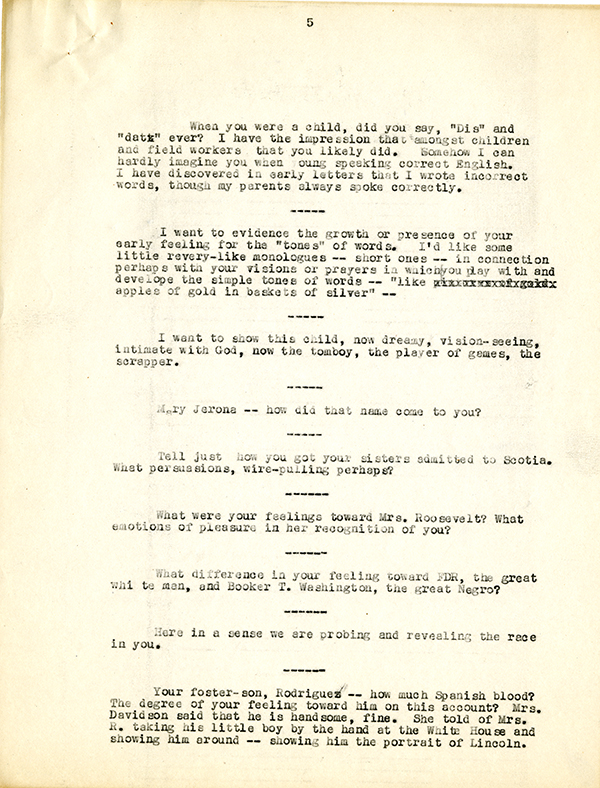
When you were a child, did you say, “Dis” and “dat” ever? I have the impression that amongst children and field workers that you likely did. Somehow I can hardly imagine you when young speaking correct English. I have discovered in early letters that I wrote incorrect words, though my parents always spoke correctly.
I want to evidence the growth or presence of your early feeling for the “tones” of words. I’d like some little revery-like monologues — short ones — in connection perhaps with your visions or prayers in which you play with and develop the simple tones of worlds — “like apples of gold in baskets of silver” —
I want to show this child, now dreamy, vision-seeing, intimate with God, now the tomboy, the player of games, the scrapper.
Mary Jerona — how did that name come to you?
Tell just how you got your sisters admitted to Scotia. What persuasions, wire-pulling perhaps?
What were your feelings towards Mrs. Roosevelt? What emotions of pleasure in her recognition of you?
What difference in your feeling toward FDR, the great white man, and Booker T. Washington, the great Negro?
Here in a sense we are probing and revealing the race in you.
Your foster-son, Rodriquez — how much Spanish blood? The degree of your feeling toward him on this account? Mrs. Davidson said that he is handsome, fine. She told of Mrs. R. taking his little boy by the hand at the White House and showing him around — showing him the portrait of Lincoln.
I want to evidence the growth or presence of your early feeling for the “tones” of words. I’d like some little revery-like monologues — short ones — in connection perhaps with your visions or prayers in which you play with and develop the simple tones of worlds — “like apples of gold in baskets of silver” —
I want to show this child, now dreamy, vision-seeing, intimate with God, now the tomboy, the player of games, the scrapper.
Mary Jerona — how did that name come to you?
Tell just how you got your sisters admitted to Scotia. What persuasions, wire-pulling perhaps?
What were your feelings towards Mrs. Roosevelt? What emotions of pleasure in her recognition of you?
What difference in your feeling toward FDR, the great white man, and Booker T. Washington, the great Negro?
Here in a sense we are probing and revealing the race in you.
Your foster-son, Rodriquez — how much Spanish blood? The degree of your feeling toward him on this account? Mrs. Davidson said that he is handsome, fine. She told of Mrs. R. taking his little boy by the hand at the White House and showing him around — showing him the portrait of Lincoln.
Page 3
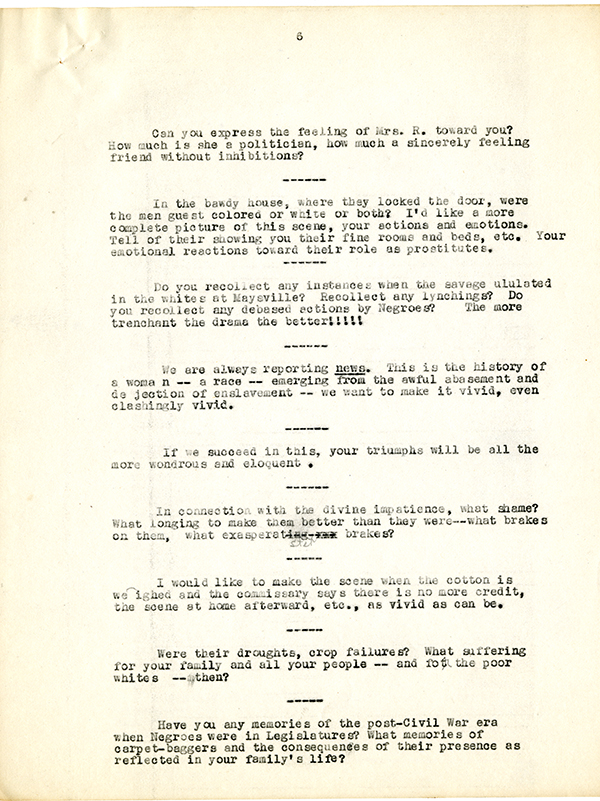
Can you express the feeling of Mr. R. toward you? How much is she a politician, how much a sincerely feeling friend without inhibitions?
In the bawdy house, where they locked the door, were the men guest colored or white or both? I’d like a more complete picture of this scene, your actions and emotions. Tell of their showing you their fine rooms and beds, etc. Your emotional reactions toward their role as prostitutes.
Do you recollect any instances when the savage ululated in the whites at Maysville? Recollect any lynchings? Do you recollect any debased actions by Negroes? The more trenchant the drama the better!!!!!
We are always reporting news. This is the history of a woman — a race — emerging from the awful abasement and dejection of enslavement — we want to make it vivid, even clashingly vivid.
If we succeed in this, your triumphs will be all the more wondrous and eloquent.
In connection with the divine impatience, what shame? What longing to make them better than they were — what brakes on them, what exasperating brakes?
I would like to make the scene when the cotton is weighed and the commissary says there is no more credit, the scene at home afterward, etc., as vivid as can be.
Were their droughts, crop failures? What suffering for your family and all your people — and for the poor whites — then?
Have you any memories of the post-Civil War era when Negroes were in Legislatures? What memories of carpet-baggers and the consequences of their presence as reflected in your family’s life?
In the bawdy house, where they locked the door, were the men guest colored or white or both? I’d like a more complete picture of this scene, your actions and emotions. Tell of their showing you their fine rooms and beds, etc. Your emotional reactions toward their role as prostitutes.
Do you recollect any instances when the savage ululated in the whites at Maysville? Recollect any lynchings? Do you recollect any debased actions by Negroes? The more trenchant the drama the better!!!!!
We are always reporting news. This is the history of a woman — a race — emerging from the awful abasement and dejection of enslavement — we want to make it vivid, even clashingly vivid.
If we succeed in this, your triumphs will be all the more wondrous and eloquent.
In connection with the divine impatience, what shame? What longing to make them better than they were — what brakes on them, what exasperating brakes?
I would like to make the scene when the cotton is weighed and the commissary says there is no more credit, the scene at home afterward, etc., as vivid as can be.
Were their droughts, crop failures? What suffering for your family and all your people — and for the poor whites — then?
Have you any memories of the post-Civil War era when Negroes were in Legislatures? What memories of carpet-baggers and the consequences of their presence as reflected in your family’s life?
Page 4
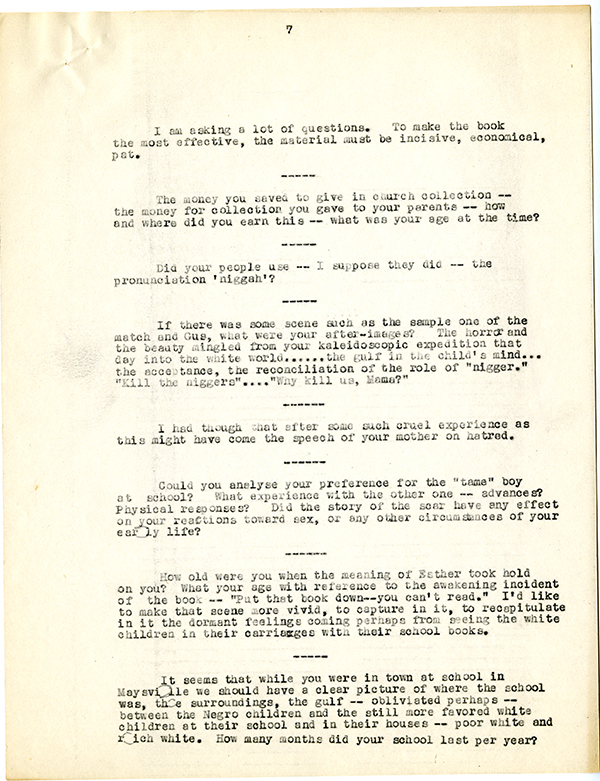
I am asking a lot of questions. To make the book the most effective, the material must be incisive, economical, pat.
The money you saved to give in church collection — the money for collection you gave to your parents — how and where did you earn this — what was your age at the time?
Did your people use — I suppose they did — the pronunciation ‘niggah’?
If there was some scene such as the sample one of the match and Gus, what were your after-images? The horror and the beauty mingled from your kaleidoscopic expedition that day into the white world… the gulf in the child’s mind… the acceptance, the reconciliation of the role of “nigger.” “Kill the niggers” … “Why kill us, Mama?”
I had thought that after some such cruel experience as this might have come the speech of your mother on hatred.
Could you analyze your preferences for the “tame” boy at school? What experience with the other one — advances? Physical responses? Did the story of the scar have any effect on your reactions toward sex, or any other circumstances of your early life?
How old were you when the meaning of Esther took hold on you? What your age with reference to the awakening incident of the book — “Put that book down—you can’t read.” I’d like to make that scene more vivid, to capture in it, to recapitulate in it the dormant feelings coming perhaps for seeing the white children in their carriages with their school books.
It seems that while you were in town at school in Maysville we should have a clear picture of where the school was, the surroundings, the gulf — obviated perhaps — between the Negro children and the still more favored white children at their school and in their houses — poor white and rich white. How many months did your school last pear year?
The money you saved to give in church collection — the money for collection you gave to your parents — how and where did you earn this — what was your age at the time?
Did your people use — I suppose they did — the pronunciation ‘niggah’?
If there was some scene such as the sample one of the match and Gus, what were your after-images? The horror and the beauty mingled from your kaleidoscopic expedition that day into the white world… the gulf in the child’s mind… the acceptance, the reconciliation of the role of “nigger.” “Kill the niggers” … “Why kill us, Mama?”
I had thought that after some such cruel experience as this might have come the speech of your mother on hatred.
Could you analyze your preferences for the “tame” boy at school? What experience with the other one — advances? Physical responses? Did the story of the scar have any effect on your reactions toward sex, or any other circumstances of your early life?
How old were you when the meaning of Esther took hold on you? What your age with reference to the awakening incident of the book — “Put that book down—you can’t read.” I’d like to make that scene more vivid, to capture in it, to recapitulate in it the dormant feelings coming perhaps for seeing the white children in their carriages with their school books.
It seems that while you were in town at school in Maysville we should have a clear picture of where the school was, the surroundings, the gulf — obviated perhaps — between the Negro children and the still more favored white children at their school and in their houses — poor white and rich white. How many months did your school last pear year?

 Listen: The Assorted Selections Program
Listen: The Assorted Selections Program